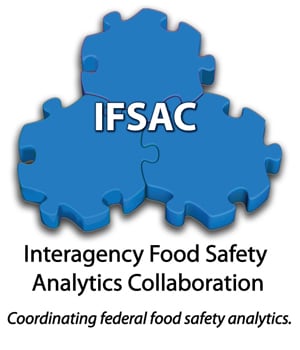Attribution of Foodborne Illness: Improving Attribution Through Partnership
Interagency Food Safety Analytics Collaboration (IFSAC)

While CDC does not have regulatory authority for many food safety policies, the data that CDC collects and shares can influence policy and programmatic development through FDA and FSIS.
To enhance the safety of our food, three federal agencies—the Centers for Disease Control and Prevention (CDC), the U.S. Food and Drug Administration (FDA), and the Food Safety and Inspection Service (FSIS) of the United States Department of Agriculture (USDA)—teamed up in 2011 to create the Interagency Food Safety Analytics Collaboration (IFSAC).
The goal of this collaboration is to improve coordination of federal food safety analytic efforts and address cross-cutting priorities for food safety data collection, analysis, and use. IFSAC projects and studies aim to identify foods that are important sources of illnesses. The current focus of IFSAC’s activities is foodborne illness source attribution, defined as the process of estimating the most common food sources responsible for specific foodborne illnesses.
Purpose
- Address the challenges posed by foodborne illness source attribution
- Work collectively to:
- Analyze and interpret human surveillance and food contamination data
- Share data and methods
- Monitor progress toward the goal of preventing foodborne illness
Goals
- Identify, plan, and conduct selected food safety and foodborne illness analytic projects recognized as high priority by all three agencies
- Foodborne illness source attribution is the current and sole focus of IFSAC’s activities
- Improve coordination of federal food safety analytic efforts
- Address cross-cutting priorities for food safety data collection, analysis, and use
Visit the IFSAC website to learn more about the collaboration and its work >
